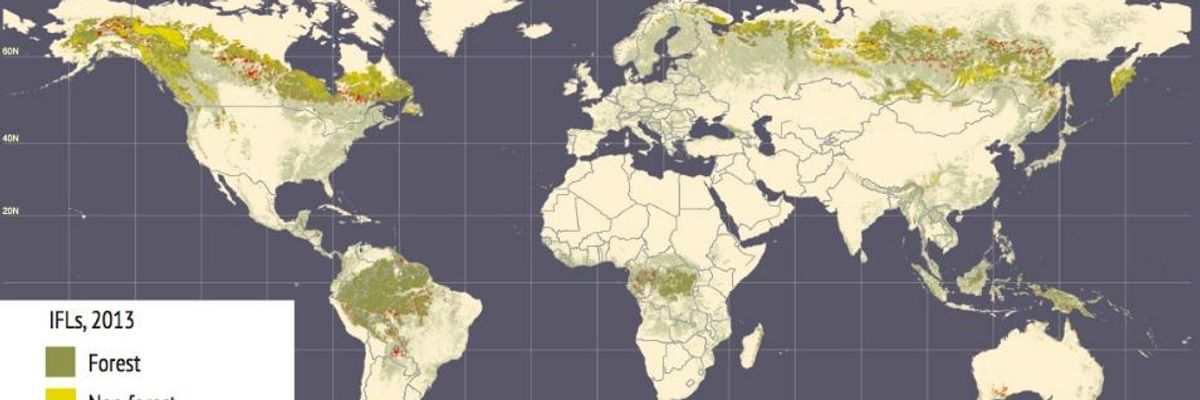
(Image: Greenpeace)
To donate by check, phone, or other method, see our More Ways to Give page.

(Image: Greenpeace)
The world's last remaining forest wildernesses are being damaged and destroyed by human activity at the shocking rate of 20,000 hectares--nearly 50,000 acres--per day, according to research findings announced Thursday.
Greenpeace, the University of Maryland, Transparent World, World Resources Institute, and World Wildlife Fund-Russia employed satellite imaging and mapping technology to chart out the global loss of Intact Forest Landscapes, which are unbroken areas of forest large enough to display biodiversity and bearing no damage from human logging, road construction, fossil fuel extraction, and more.
According to the groups, if something is not done to end the rate of destruction, these vital ecosystems could be wiped out completely before the end of next century.
The mapping done by the research found that a total area of IFLs three times the size of Germany was degraded between 2000 and 2013--amounting to over 8 percent of the world's undisturbed forests.
The largest areas of forest wilderness destruction taking place in the Northern Boreal forests of Canada, Russia and Alaska and tropical forests including the Amazon and Congo basins. Canada, Russia and Brazil are responsible for over 50 percent of this degradation, with extractive industries playing a critical role in the damage.
"There is an urgent need for governments to heed the calls of their citizens and to respect the rights of forest-dependent peoples by properly protecting remaining intact forests," said Dr. Nigel Sizer, Global Director of the Forest Program at WRI, and head of Global Forest Watch.
"Most of the degradation of intact forest landscapes is caused by fragmentation from roadbuilding, logging and clearing, meaning that we will lose these incredible landscapes and the forests that they contain if no action is taken to protect them," reads a Greenpeace statement about the findings.
Common Dreams is powered by optimists who believe in the power of informed and engaged citizens to ignite and enact change to make the world a better place. We're hundreds of thousands strong, but every single supporter makes the difference. Your contribution supports this bold media model—free, independent, and dedicated to reporting the facts every day. Stand with us in the fight for economic equality, social justice, human rights, and a more sustainable future. As a people-powered nonprofit news outlet, we cover the issues the corporate media never will. Join with us today! |
The world's last remaining forest wildernesses are being damaged and destroyed by human activity at the shocking rate of 20,000 hectares--nearly 50,000 acres--per day, according to research findings announced Thursday.
Greenpeace, the University of Maryland, Transparent World, World Resources Institute, and World Wildlife Fund-Russia employed satellite imaging and mapping technology to chart out the global loss of Intact Forest Landscapes, which are unbroken areas of forest large enough to display biodiversity and bearing no damage from human logging, road construction, fossil fuel extraction, and more.
According to the groups, if something is not done to end the rate of destruction, these vital ecosystems could be wiped out completely before the end of next century.
The mapping done by the research found that a total area of IFLs three times the size of Germany was degraded between 2000 and 2013--amounting to over 8 percent of the world's undisturbed forests.
The largest areas of forest wilderness destruction taking place in the Northern Boreal forests of Canada, Russia and Alaska and tropical forests including the Amazon and Congo basins. Canada, Russia and Brazil are responsible for over 50 percent of this degradation, with extractive industries playing a critical role in the damage.
"There is an urgent need for governments to heed the calls of their citizens and to respect the rights of forest-dependent peoples by properly protecting remaining intact forests," said Dr. Nigel Sizer, Global Director of the Forest Program at WRI, and head of Global Forest Watch.
"Most of the degradation of intact forest landscapes is caused by fragmentation from roadbuilding, logging and clearing, meaning that we will lose these incredible landscapes and the forests that they contain if no action is taken to protect them," reads a Greenpeace statement about the findings.
The world's last remaining forest wildernesses are being damaged and destroyed by human activity at the shocking rate of 20,000 hectares--nearly 50,000 acres--per day, according to research findings announced Thursday.
Greenpeace, the University of Maryland, Transparent World, World Resources Institute, and World Wildlife Fund-Russia employed satellite imaging and mapping technology to chart out the global loss of Intact Forest Landscapes, which are unbroken areas of forest large enough to display biodiversity and bearing no damage from human logging, road construction, fossil fuel extraction, and more.
According to the groups, if something is not done to end the rate of destruction, these vital ecosystems could be wiped out completely before the end of next century.
The mapping done by the research found that a total area of IFLs three times the size of Germany was degraded between 2000 and 2013--amounting to over 8 percent of the world's undisturbed forests.
The largest areas of forest wilderness destruction taking place in the Northern Boreal forests of Canada, Russia and Alaska and tropical forests including the Amazon and Congo basins. Canada, Russia and Brazil are responsible for over 50 percent of this degradation, with extractive industries playing a critical role in the damage.
"There is an urgent need for governments to heed the calls of their citizens and to respect the rights of forest-dependent peoples by properly protecting remaining intact forests," said Dr. Nigel Sizer, Global Director of the Forest Program at WRI, and head of Global Forest Watch.
"Most of the degradation of intact forest landscapes is caused by fragmentation from roadbuilding, logging and clearing, meaning that we will lose these incredible landscapes and the forests that they contain if no action is taken to protect them," reads a Greenpeace statement about the findings.